Health expert says hepatitis C could be eliminated quickly in Scotland
- Published
"I was deliberately infected with Hep C"
A leading expert in hepatitis C has said it could be removed from Scotland in the next five years if efforts to cure people were "energised".
Three years ago the Scottish government pledged to eliminate the chronic viral infection from Scotland by 2030.
But earlier this year a report by The Hepatitis C Trust, external said it was not on track to meet that target.
Prof John Dillon said Scotland had the opportunity to cure the disease completely in the next few years.
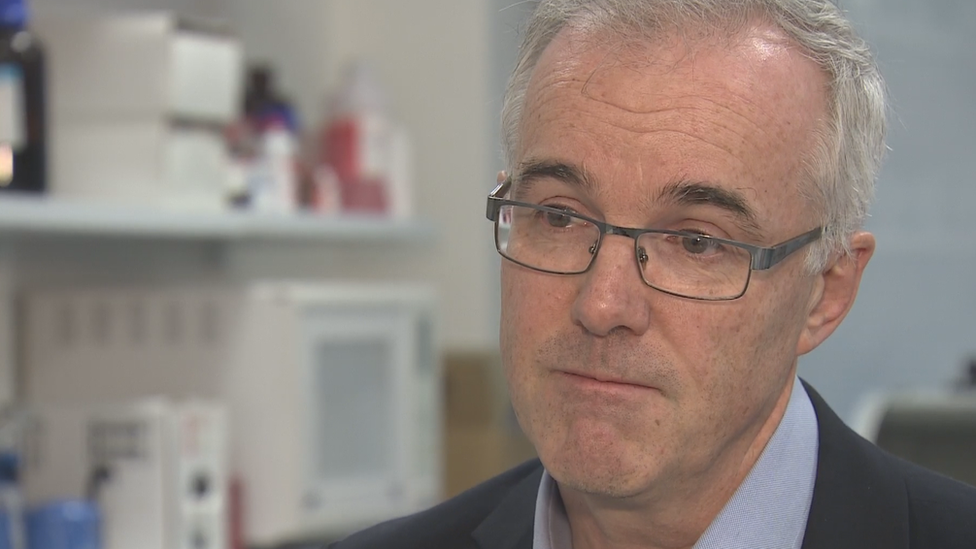
Prof John Dillon said now was the time to move to elimination of hep C
Experts said Scotland was heavily involved in the development of the wonder drugs which now offer a cure for the virus, which over time can lead to cancer and liver failure.
They are pushing for ministers to be more ambitious in identifying and treating the tens of thousands of people still infected.
Most of them have a history of injecting drugs and many are homeless and difficult for health professionals to reach.
'National priority'
The Scottish government insisted eliminating hep C was a priority and it was on track.
In its report, The Hepatitis C Trust said tackling the disease should be a "national priority" and the falling cost of treatments meant Scotland should try to eliminate hep C even quicker than the target.
Prof Dillon, the chair of the clinical leads for hepatitis C in Scotland, said it could be done within five years if Scotland was prepared to increase its efforts.

What is hepatitis C?
It is a blood-borne virus that primarily affects the liver and can cause fatal cirrhosis and liver cancer if left untreated.
It is transmitted through blood-to-blood contact, and disproportionately affects groups such as people who inject drugs, homeless people and men who have sex with men.
Significant numbers were infected by the NHS through infected blood and blood products.
People infected with hepatitis C often experience few or no symptoms, which can result in them living with the virus for many years without being diagnosed, increasing the risk of severe liver damage.
Hepatitis C is preventable, treatable and has cure rates of upwards of 95%.
Scotland also has the highest prevalence of the virus in the UK and about 1,800 new cases are diagnosed each year.

How many people are affected?
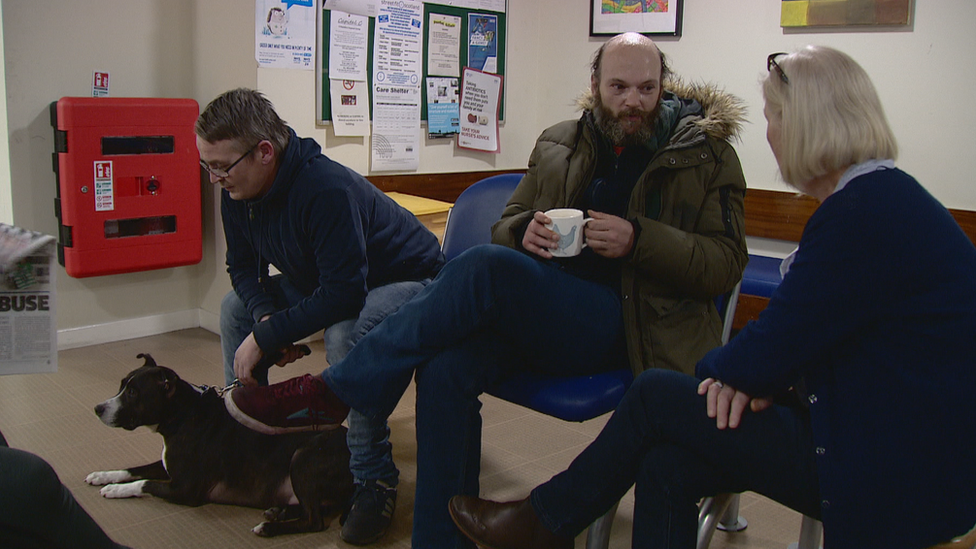
In 2016 it was estimated that about 34,500 people were infected with hepatitis C in Scotland.
The vast majority were injecting drug users and almost half were thought to be undiagnosed.
Experts said each infected person could pass it on to up to 30 others over a 10-year period.
Even after treatment and cure, it is possible to catch the virus again through repeated contact, so hepatitis C can only be eliminated if cure rates are consistently higher than new infection rates.
That requires high and sustained rates of both diagnosis and treatment.

How can it be tackled?
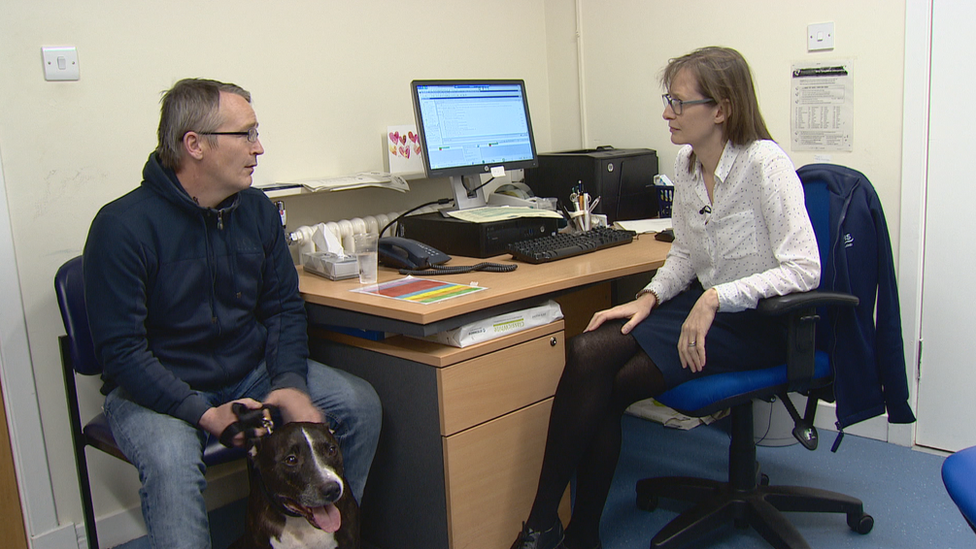
Prof Dillon said many of the people affected by hepatitis C were among communities who used drugs and they were often homeless or disenfranchised.
He said there needed to be new methods for bringing those patients into therapy.
Prof Dillon said that meant putting treatment into opiate substitution therapy areas, into needle exchanges, community pharmacies and perhaps prisons.
He said the cost of the drugs had fallen to about 12.5% of the cost they were four years ago.
Quadrupling the numbers of patients in treatment could be achieved even with just half the funding that was available a few years ago, he said.
Prof Dillon said: "There are competing demands for all healthcare resource but we can eliminate hepatitis C so this is an investment over three or four years to get rid of it completely and then you don't need it any more.
"We have a moment of opportunity to move forward and eliminate very quickly but at the moment we are slowing down and treating to target.
"We could still get back on that track and up it to eliminate from Scotland hepatitis C by 2025 or even 2023."
NHS Tayside, where Prof Dillon works, has committed to elimination and hopes to achieve it next year.
Other parts of the UK are aiming to eliminate hepatitis C by 2025.
A Scottish government spokesman said: "Eliminating hepatitis C is a priority and we are on track to do this by 2030.
"We're working with Health Protection Scotland to develop a plan to further enhance Scotland's progress and eliminate hepatitis C earlier than that.
"This year, we are on track to treat significantly more people than our target of 2,000."

'When you're on the streets you don't care about yourself'
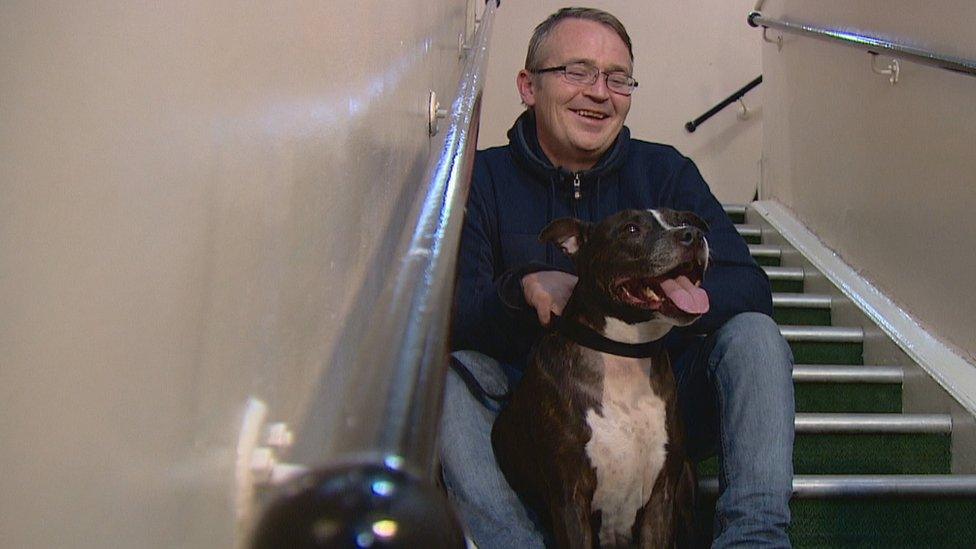
Brian and his dog Cooper went to the Edinburgh Access Practice
Edinburgh Access Practice is no ordinary GP surgery.
There are no appointments, dogs are welcome and most of the patients know each other.
The aim is bring in people who would not normally have access to a GP.
Brian has recently finished his hepatitis C treatment at the practice.
He lost his council flat when his mum died.
He was offered B&B accommodation but they wouldn't take his dog, Cooper, so the two of them slept on the streets for three months until a space came up at a hostel that took dogs.
"Through my own mistakes I ended up getting septicaemia in my blood," he said.
"It could have been through needles or a tourniquet, I don't know.
"I would have died but the doctors came looking on the streets trying to find me."
Brian wouldn't go into hospital until he got carers for his dog.
He said he did not trust anyone with him on the streets.
One of the doctors got a foster carer for Cooper and Brian spent two weeks in hospital.
He said having that help and reassurance from the Access Practice about his dog was the first step in starting to look after himself.
Brian said: "It wasn't his fault he was on the streets, so I was just trying to protect him. He's never left my side.
"Now I've been put on a methadone programme, which has helped me a lot, and I've done my hepatitis C treatment, which is all clear now.
"I just need another test in three months but the treatment's worked."
Brian added: "When you're on the streets you don't care about yourself but the clinic here jumped in, and they've done lots for me.
"Now I want to make my family proud and I've got goals set and I want to achieve them."

'I've been homeless on and off since I was 14'
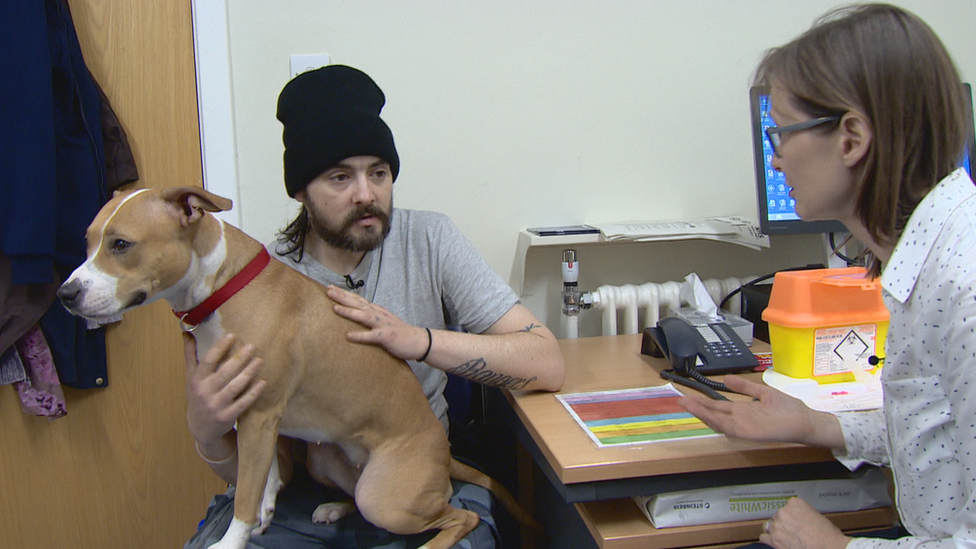
Deano and dog Bailey have lived rough for years
Deano Stewart is half way through his treatment for hepatitis C at the practice.
He grew up in care but has been homeless most of his life.
Deano recently moved into a hostel in Leith but before that he shared a doorway above Victoria Street with his dog, Bailey.
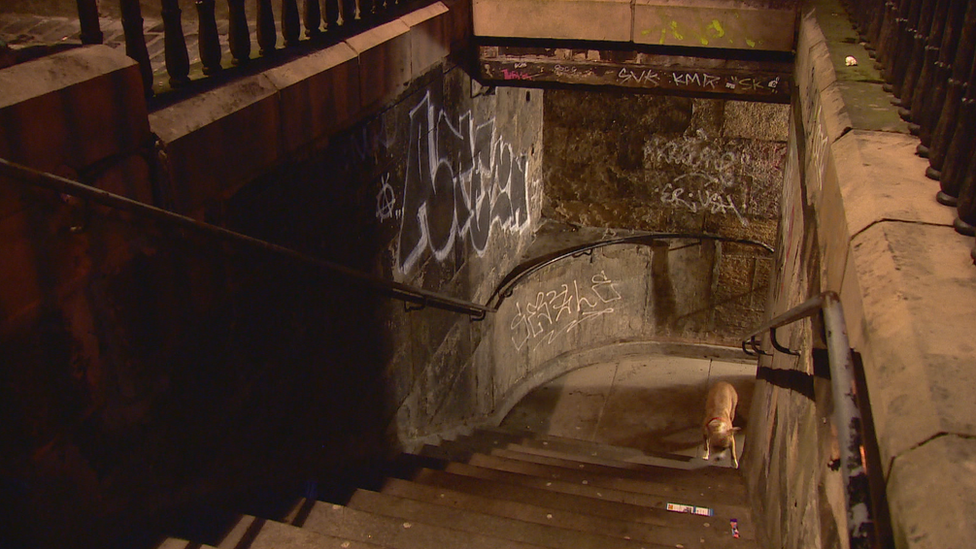
Deano slept in a doorway in the centre of Edinburgh for years
He said: "For the past 28 years it's all I've known. I've been homeless on and off since I was 14."
"People don't see me as a human being any more because I sit and beg and I sleep on the streets."
He said the last thing he was thinking about when he was on the streets was his health.
"I got given hepatitis C deliberately 20 years ago," he said.
"Some guy gave me it deliberately because I wouldn't give him drugs - I was selling drugs at the time - so he used one of my needles and then put it back. That's how I got mine."
Deano said the first time he got treatment for hepatitis C it was "really nasty".
It used to be an injection and tablets which had severe side effects.
"This time it's just a tablet you take and it's only for eight to 12 weeks and there's not any side effects," he said.
"Now I'm half way through it and I'm just hoping it works this time and I get rid of it."
Deano said: "I want to become a drug worker and a key worker.
"And the dog's going to be doing pet therapy with old people and in hospital and sick kids.
"She'll have her own wee badge and that. But it just takes time."

'I'd had it for 14 years and I just wanted to get cured'
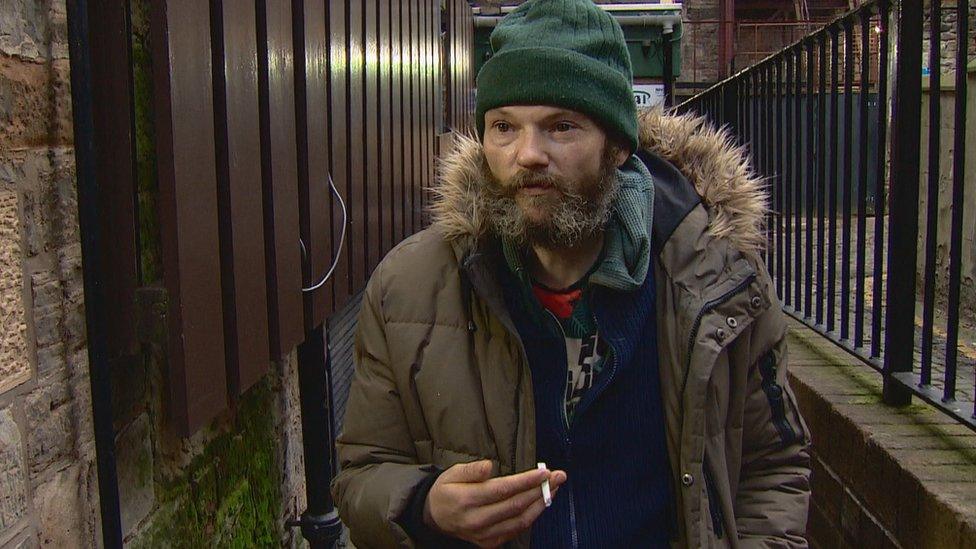
Darren Ritchie said he was chuffed to have a clean bill of health
Darren Ritchie was given a grant to study film at Napier University but needed money for drugs so dropped out.
He said he can't go back.
"I've got bipolar disorder and I can't motivate myself to do anything apart from listening to music and watching the TV," Darren said.
"I think I've let myself down because I could have been moving on and doing something better with my life but that's how things go. That's the way the cookie crumbles. It's a mad world."
He has had the treatment and is all clear of hepatitis C.
Darren said he contracted hep C by accident when he went to get a pound coin out of a bucket and got stabbed by a needle.
He said: "There was people in my house jagging up but I wasn't sharing needles, I've never done that.
"I'd had it for 14 years and I just wanted to get cured and get a clean bill of health."